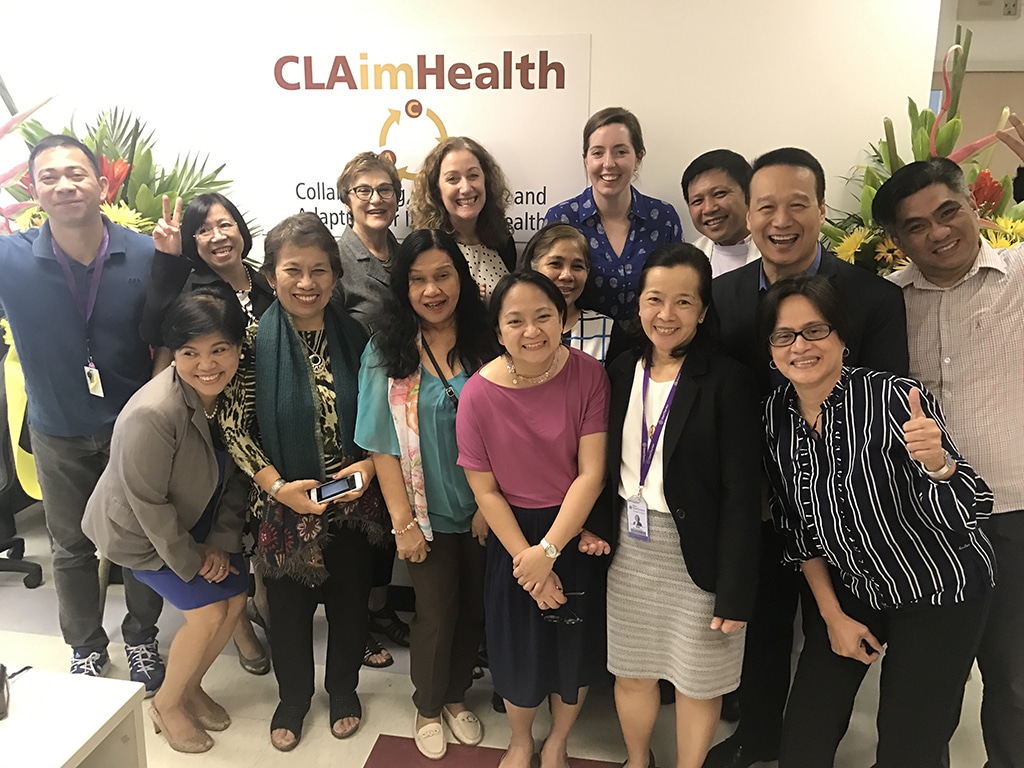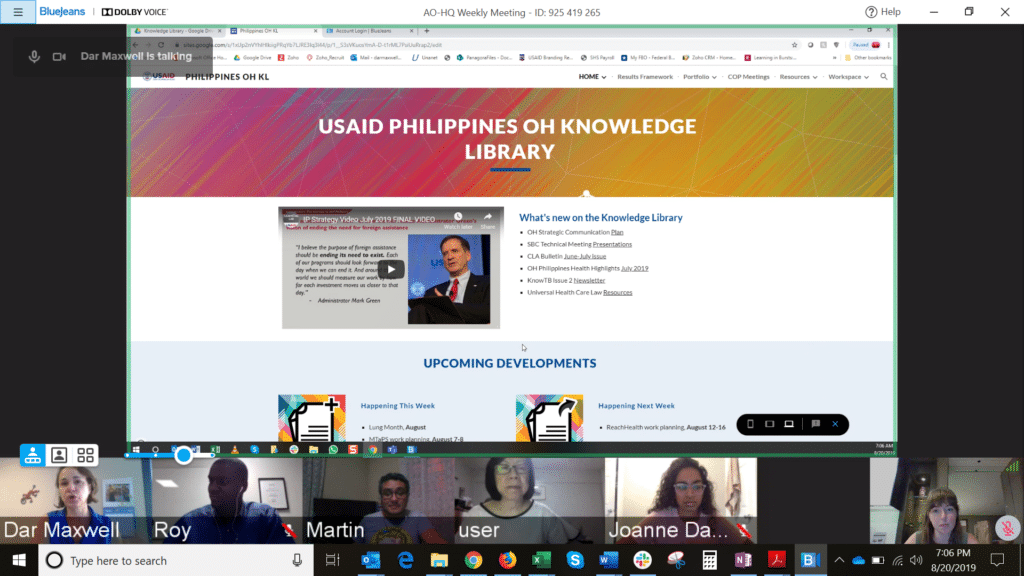
2018 Office Blessing and Opening
USAID’s health programming partnership with the Philippine government dates back to the Agency’s founding 60 years ago. The USAID/Philippines CLAimHealth (CLA for Improved Health) MEL Platform helped deepen the impact of this partnership by establishing a collaborating, learning, and adapting (CLA) culture in the USAID/Philippines Office of Health and among its implementing partners.
Implemented from February 2018 to March 2022, CLAimHealth provided performance monitoring, evaluation, and, importantly, evidence generation. Through an active CLA Technical Working Group composed of USAID AORs and CORs, implementing partner COPs and M&E officers, and national CLA champions, CLAimHealth facilitated the collaborative learning among stakeholders needed for continuous improvement and accountability needed to ultimately achieve better health outcomes for Filipinos.
The activity used a three-pronged strategy: (1) establish CLA platforms and tools, and (2) build CLA skills across stakeholder groups, and (3) measure performance and share results to learn and adapt. A 2021 external assessment demonstrated how this strategy strengthened processes, skills, attitudes, and collaboration in the Office of Health and among its implementing partners, even during the COVID-19 pandemic.
CLAimHealth embodied its investments in collaborating platforms in USAID/Philippines’ Country Development Cooperation Strategy and its Development Objective Agreement (DOAg) with the Government of the Philippines. Collective visioning meetings of the DOAg management committee and the DOAg steering committee, and joint program reviews with the Department of Health, the Philippine Commission on Population and Development, and other partners ensured the complementarity of USAID investments with Philippine government priorities.
“The journey continues… The mainstreaming of CLA across the Mission will characterize the next chapter in the partnership between USAID and the Philippines” – Michelle Lang-Alli
Director, USAID/Philippines Office of Health
New initiatives by the Office of Health were also supported through co-creation workshops involving multi-sector stakeholder groups to ensure better ownership and sustainability. Support for promoting a culture of internal and external collaboration extended through the development of CLA platforms such as the CLA Technical Working Group, pause and reflect sessions, and adaptive management sessions. These meetings also ensured that cross-cutting themes would be represented across the portfolio. CLAimHealth conducted learning and adaptive management sessions to build institutional and individual M&E/CLA capacities.

Office of Health Knowledge Library
The CLAimHealth team also developed the OH Knowledge Library, an innovative online knowledge exchange and collaboration platform. The Knowledge Library is a one-stop repository of Health Project information, partners’ plans, products and reports, and venues for collaborative engagement. It also hosts newsletters, including CLAimHealth’s quarterly CLA digest, the CLA Bulletin. The OH Knowledge Library also integrates CLAimHealth’s CLA Toolkit, a legacy guide highlighting an optimal CLA approach at all phases of the program cycle.
Efficient course correction and adaptive management requires quality data. CLAimHealth consolidated and analyzed performance data for mid-year reviews and end-of-year Health Project performance evaluations. CLAimHealth also conducted data quality assurance activities and third-party monitoring. CLAimHealth also supported OH in developing a web-based interim solution for data mapping and visualization. Most importantly, we conducted annual performance evaluations and supported an independent team that performed a mid-cycle whole-of-project evaluation (WOPE) of the Health Project. In particular, the WOPE assessed the suitability of the Health Project’s existing configuration for meeting its goals, and recommended adaptations for the remaining life of the project and strategic directions for the next program cycle.
COVID-19 forced CLAimHealth to pivot to virtual and hybrid M&E/CLA approaches. This included accelerating experiments on web-based meetings and adopting digital-first strategies. We also conducted implementation research on the Health Project’s COVID-19 adaptations and its use of remote and hybrid M&E approaches.
Beyond CLAimHealth’s investment in organizational learning, the team also promoted evidence-based programming and action. We identified and documented eight good practices and promising interventions from Health Project activities. Implementation research on M&E/CLA approaches and secondary analyses of data on family planning and tuberculosis provided further guidance for project planning and adaptive management.
In 2021, the CLAimHealth team supported USAID/Philippines’ Office of Health to conduct the first ever Mission-level CLA Awards—a CLA case competition and an unofficial barometer of how well implementing partners have taken our CLA tools, platforms, and skills and technology transfer to heart. The Mission is launching a second competition this year.
As the project concludes its four-year journey, the CLAimHealth team’s own assessment yields six key learnings for the next leg of the CLA journey:
- CLA champions matter.
- The CLA Technical Working Group is pivotal to collaborative work.
- Invest time and resources in CLA.
- Practice makes perfect.
- Virtual collaboration tools can work after all.
- There is no need to reinvent the wheel but customizing and localizing it promotes buy-in and sustainability.
CLAimHealth also offers four key recommendations for USAID:
- Consider CLAimDev, the Mission-wide platform for M&E/CLA, as a gateway to continued support for CLA across the Health Project.
- Allow more flexibility into cooperative agreement mechanisms and task order contracts to align with CLA guiding principles.
- Designate OH staff to champion and implement specific workstreams related to M&E/CLA tasks.
- Refine and promote the use of the OH CLA Toolkit.
As the Director of the USAID/Philippines Office of Health, Michelle Lang-Alli puts it, “[t]he journey continues… The mainstreaming of CLA across the Mission will characterize the next chapter in the partnership between USAID and the Philippines.”
Join us on the next part of the CLA journey!